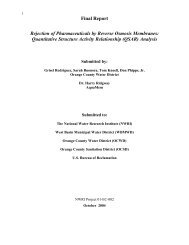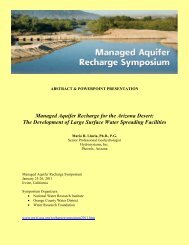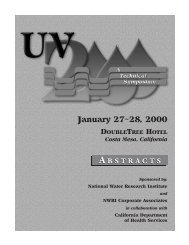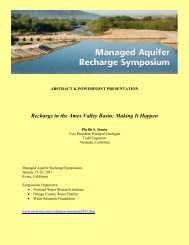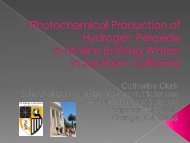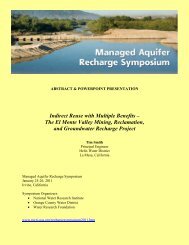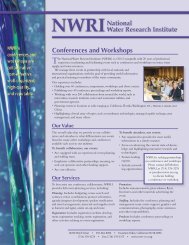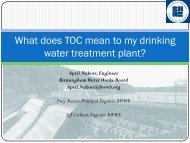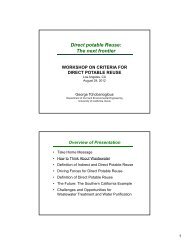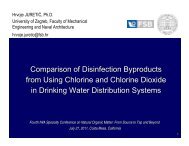RBF_Cover (for eps) - National Water Research Institute
RBF_Cover (for eps) - National Water Research Institute
RBF_Cover (for eps) - National Water Research Institute
Create successful ePaper yourself
Turn your PDF publications into a flip-book with our unique Google optimized e-Paper software.
Session 1: Costs<br />
The Costs and Benefits of Riverbank-Filtration Systems<br />
Stephen A. Hubbs, P.E.<br />
Louisville <strong>Water</strong> Company<br />
Louisville, Kentucky<br />
Henry C. Hunt, CPG<br />
Collector Wells International, Inc.<br />
Columbus, Ohio<br />
Jürgen Schubert<br />
Stadtwerke Düsseldorf<br />
Düsseldorf, Germany<br />
The Benefits of Riverbank Filtration<br />
The history of <strong>RBF</strong> in modern times is connected to the experience of disease outbreaks in Europe<br />
in the 1890s, with specific reference to the cholera epidemic in Hamburg, Germany, in 1892. The<br />
preference <strong>for</strong> groundwater, <strong>RBF</strong>, and artificial recharge to surface water stems from this<br />
experience, noting much more wholesome water from these sources than from surface water.<br />
A much earlier reference to <strong>RBF</strong> (albeit far less scientific) is found in the Bible:<br />
The fish that were in the Nile died, and the Nile became foul, so that the Egyptians<br />
could not drink water from the Nile … So all the Egyptians dug around the Nile <strong>for</strong><br />
water to drink, <strong>for</strong> they could not drink of the water of the Nile. (Exodus 7, 21-24)<br />
Thus, it appears that the benefits of <strong>RBF</strong> are anything but new!<br />
The benefits of <strong>RBF</strong> have been cataloged in recent publications to include:<br />
• Particle removal.<br />
• Pathogen removal.<br />
• Organic and inorganic chemical removal.<br />
• Peak smoothing in spills.<br />
• Reduction in DBP <strong>for</strong>mation.<br />
• Production of a more biologically stable water.<br />
When faced with the decision to choose an advanced treatment technology <strong>for</strong> its two treatment<br />
plants, the Louisville <strong>Water</strong> Company in Louisville, Kentucky, sought to compare these benefits<br />
against the benefits of in-plant treatment techniques from both a treatment efficiency perspective<br />
and cost-based perspective; however, a comprehensive, quantitative measure was difficult to develop.<br />
Correspondence should be addressed to:<br />
Stephen A. Hubbs, P.E.<br />
Vice President, New Technology<br />
Louisville <strong>Water</strong> Company<br />
550 South Third Street • Louisville, Kentucky 40202 USA<br />
Phone: (502) 569-3675 • Fax: (502) 569-0813 • Email: SHubbs@lwcky.com<br />
3



